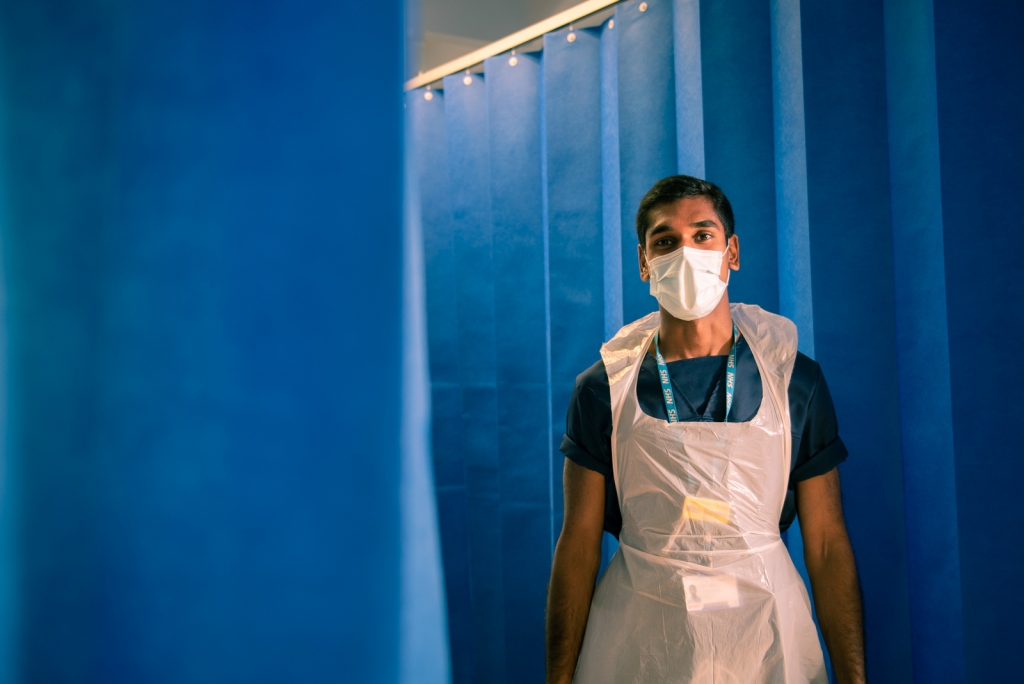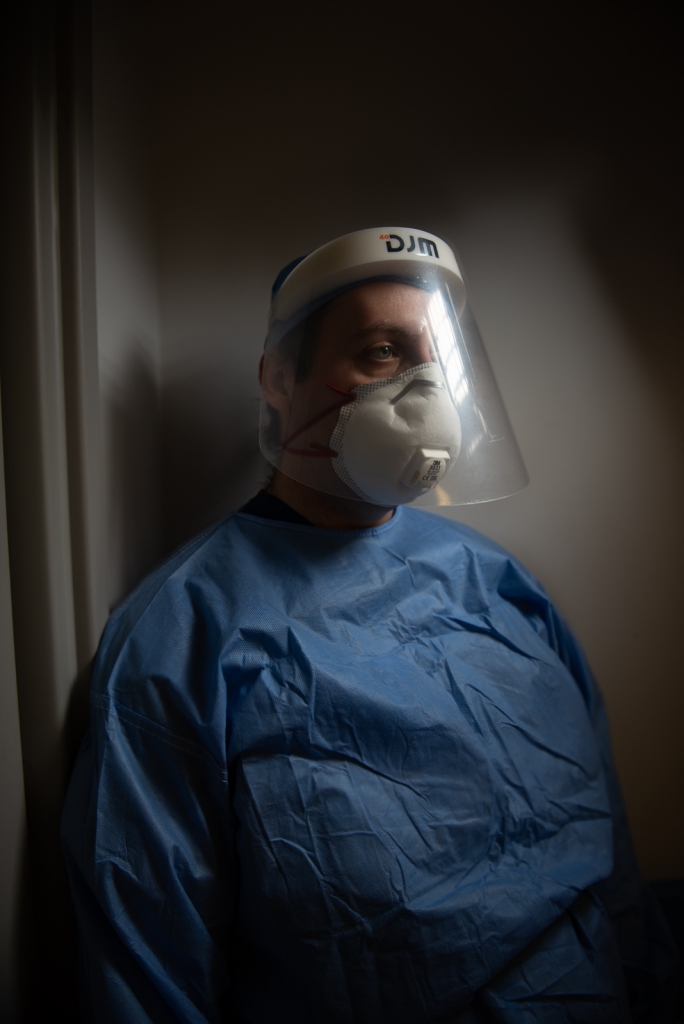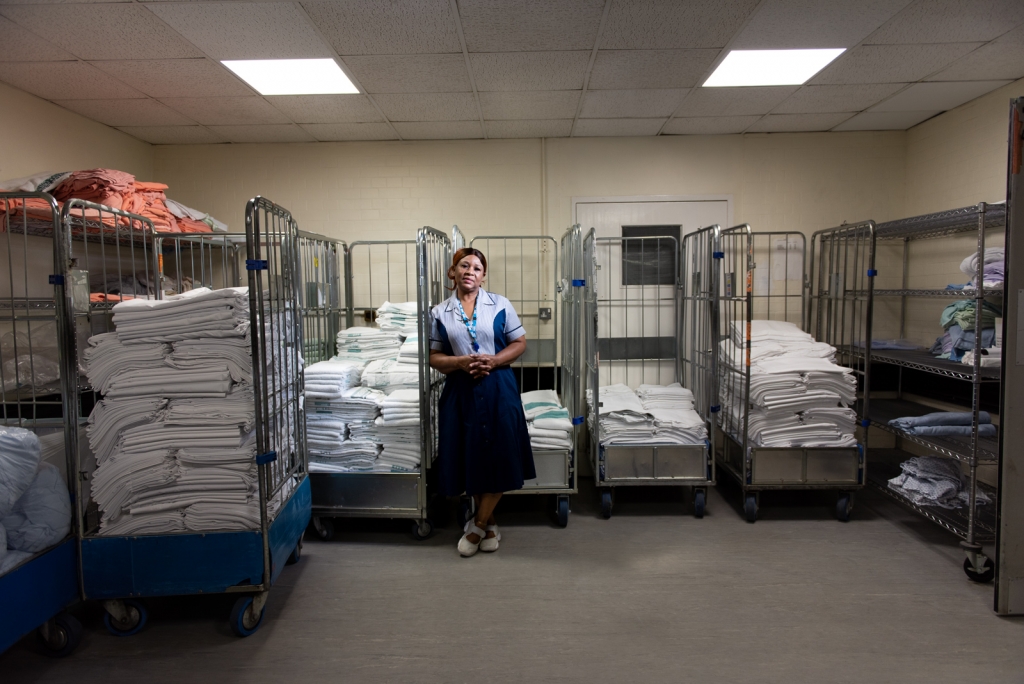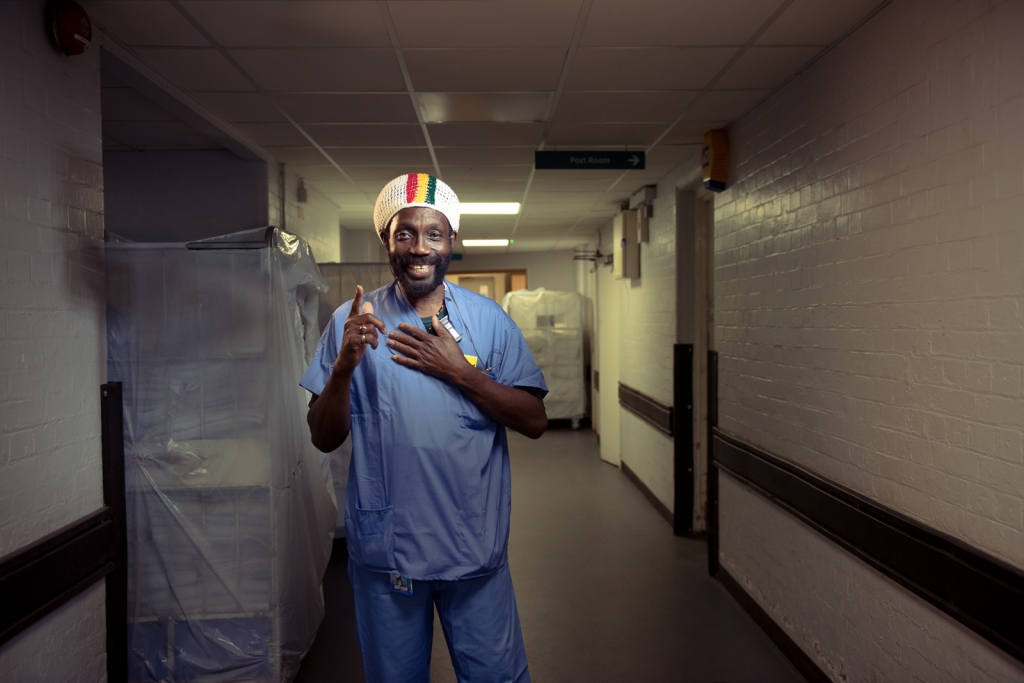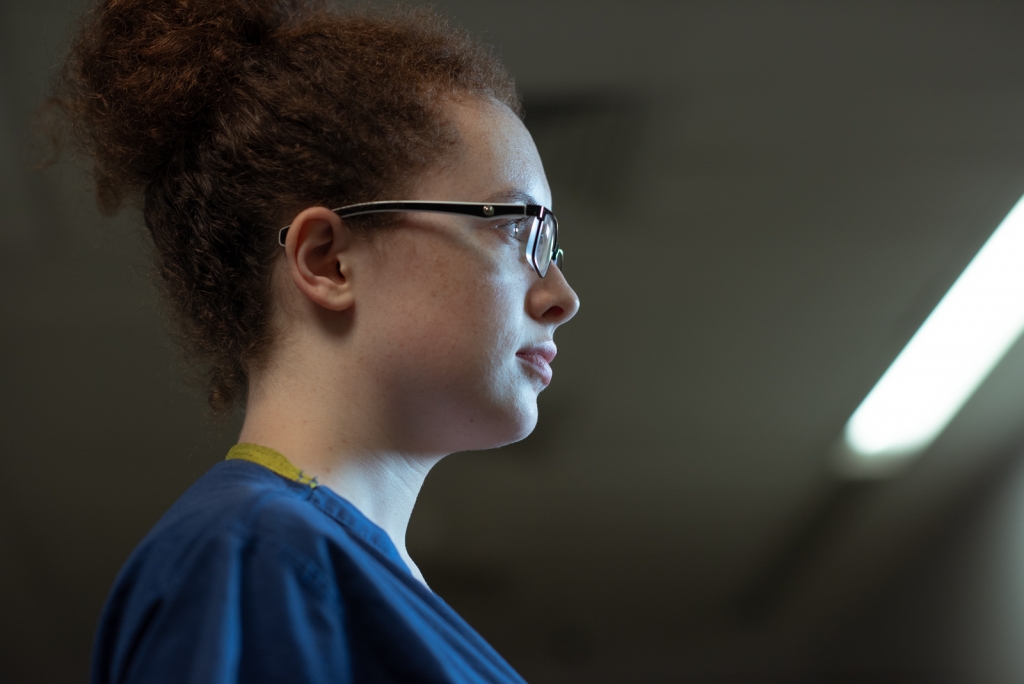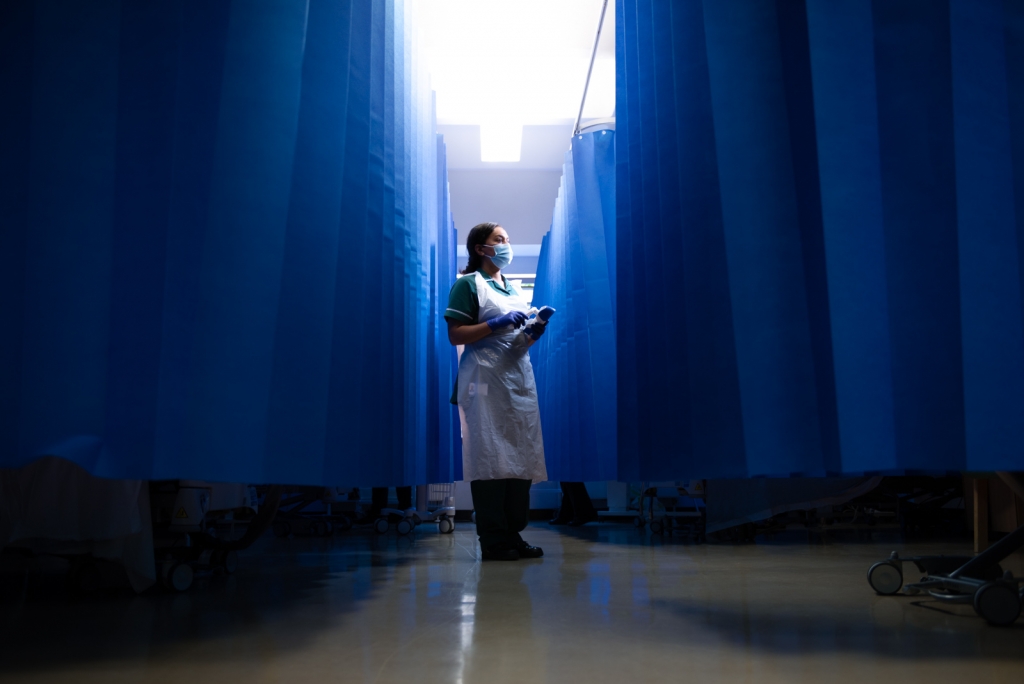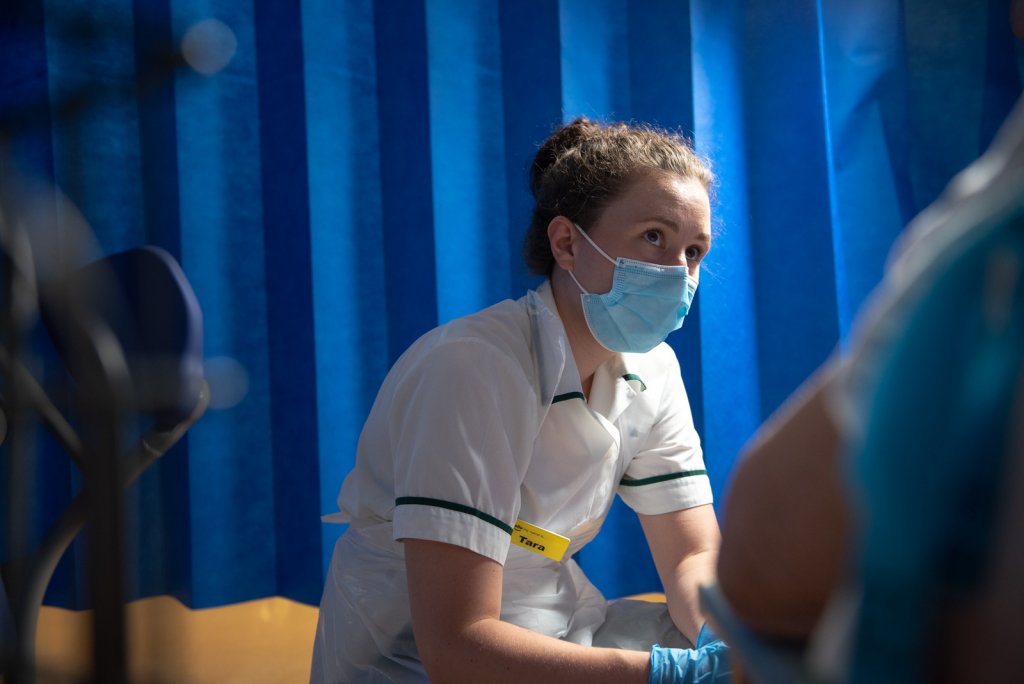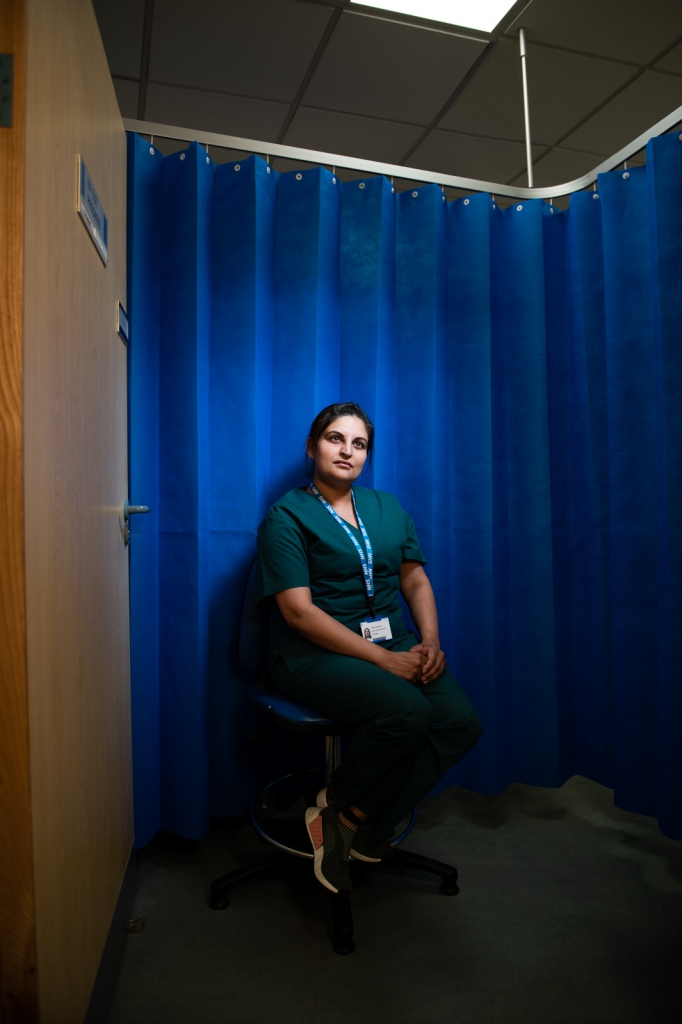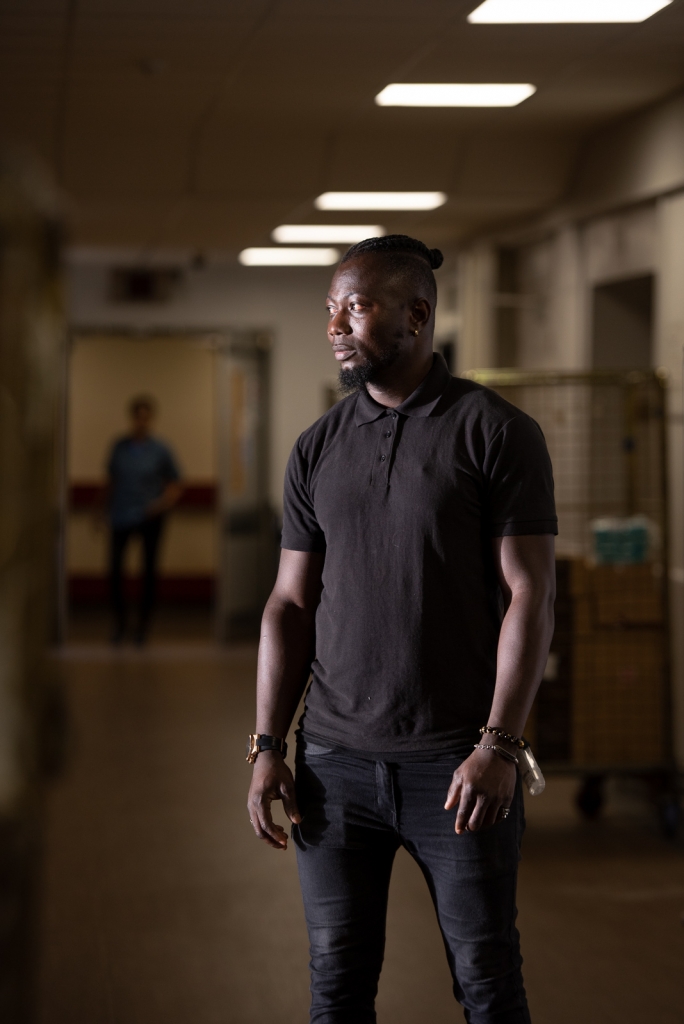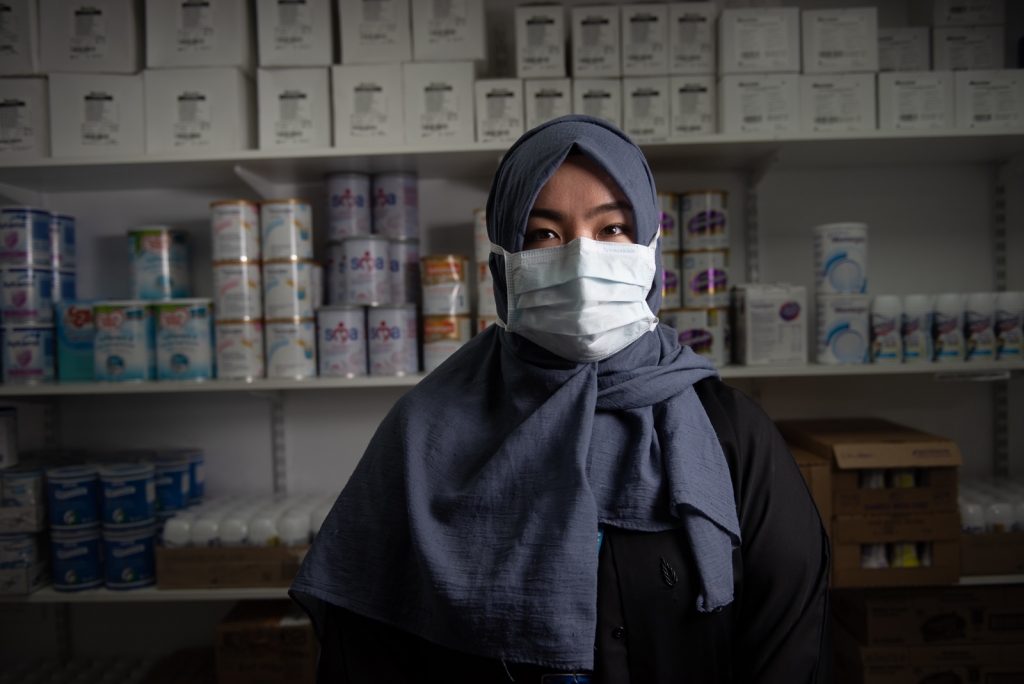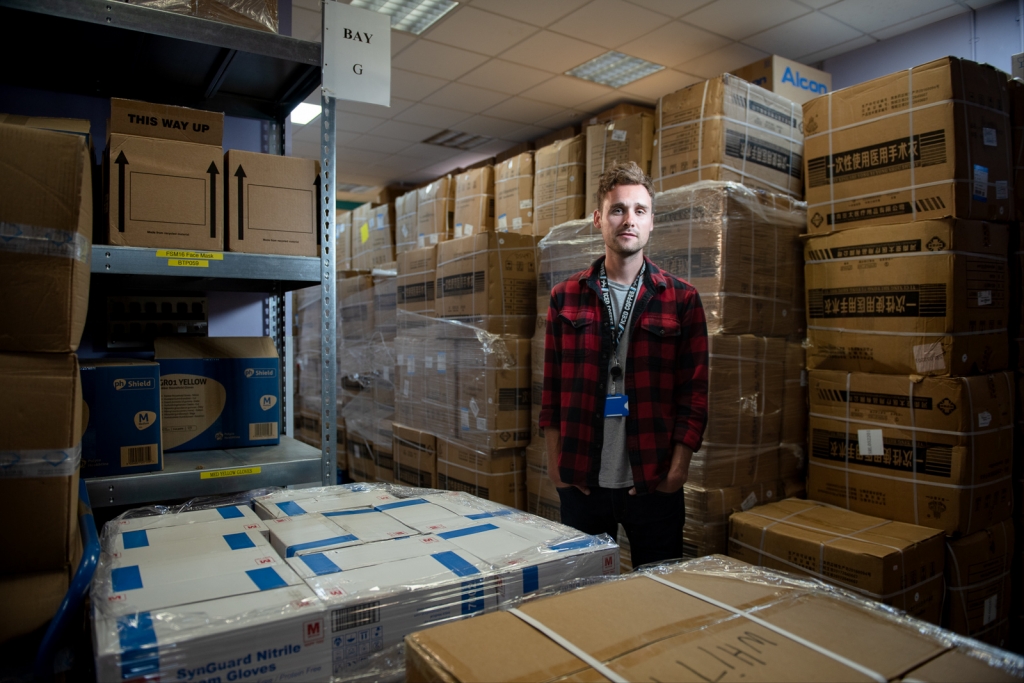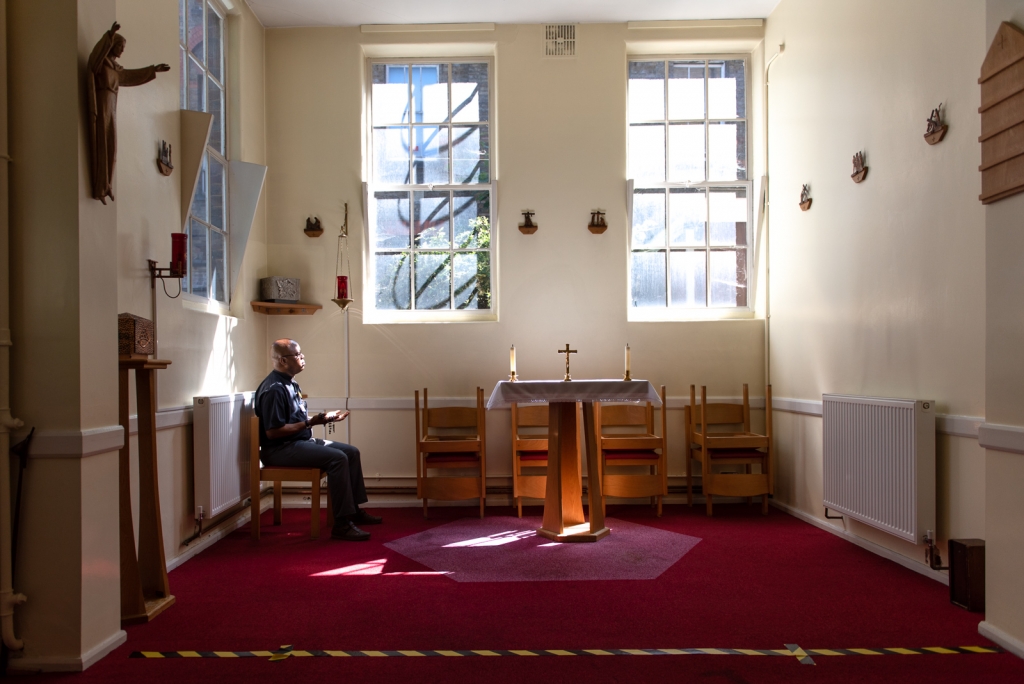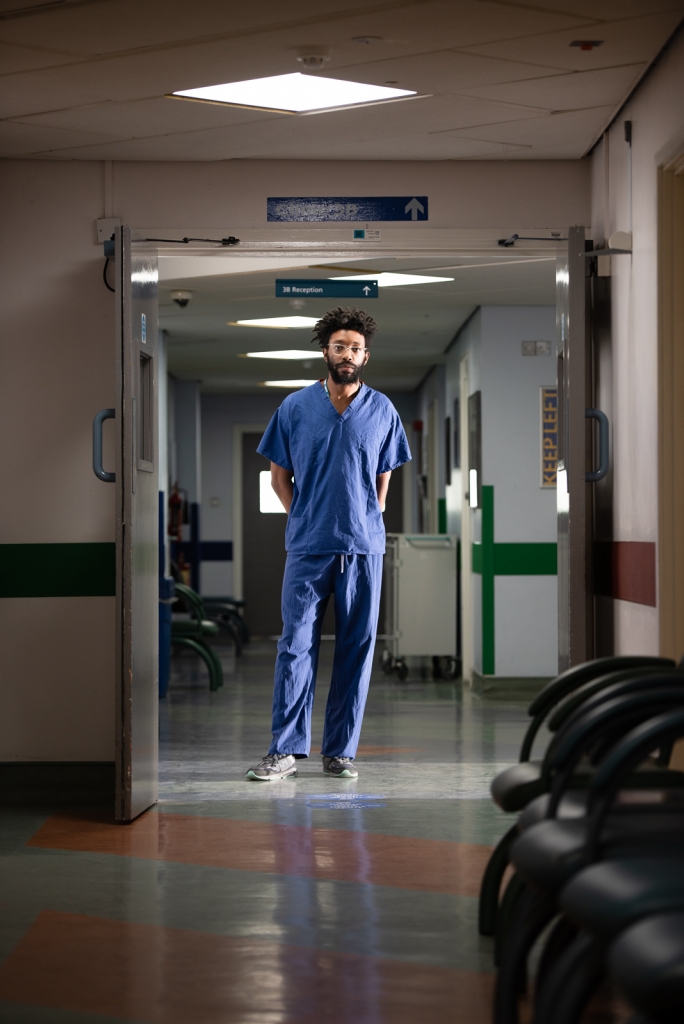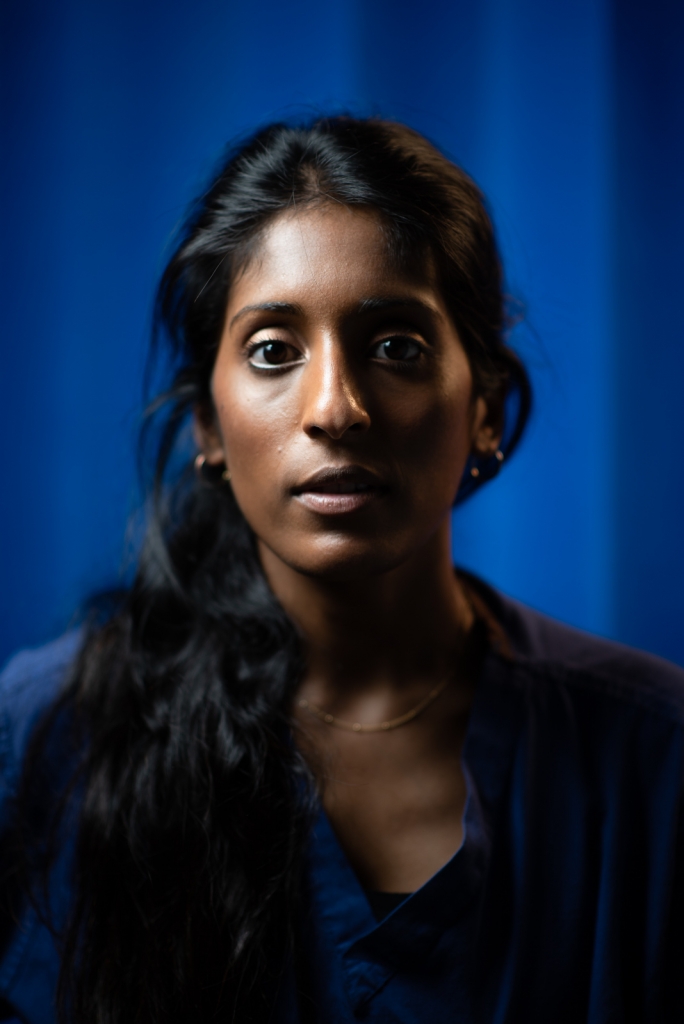This is just a small selection
of the 92 people featured in my book
Mihir – Speciality Registrar, Cardiology
It’s been obviously very challenging, not just from a professional perspective, but also personally. I haven’t seen my parents for quite a while, and I haven’t seen my extended family either.
My wife’s pregnant, and we don’t know how Coronavirus affects pregnancy – we don’t know whether I’ve had it, I don’t know whether she’s had it, and it’s difficult to determine whether we should even be living together still, or whether we should be living apart. We are in a place where there is the biggest exposure risk in the entire country: a hospital in which there are lots of Coronavirus patients.
But whatever your personal feelings on the matter, ultimately, you’ve been trained to try to deal with these sorts of situations and so you focus your mind and you get on with the job in hand. This is not something that we wanted to do, but it’s something that’s arisen.
And I can certainly say that everyone from this department has risen to the challenge extremely well.
Ryan – Domestic
Working here in PPE is quite daunting at first. When people with Covid started arriving on the ward, it was a strange feeling knowing that everything’s going to have to change, and that we’re going to have to get used to a new way of living. And when it got to the point where everyone in the ward had Covid, it was a case of trying to concentrate, and only focus on what you need to do. And that’s how I got through things.
Looking after your mental health is an ongoing thing. I do still feel under pressure and stressed out, but I try to not dwell upon it. That way I can concentrate on what I need to do. It’s not only for my benefit, but for everybody else’s benefit as well, because everyone here is under a lot of pressure.
One of the things that our ward’s been trying to do over the past few weeks is to seek counselling from people who are qualified to help you. I’ve found their advice to be very helpful – I took it to heart, and it’s improved my mental well being.
Joy – FSA Housekeeping
I remember one day coming to work and I was crying. I didn’t want to come because there was so much people just dying, dying, dying in my ward. But I knew I had to do it. Because you know, everybody can’t stay home. I had other workers that couldn’t make it because some scared, some sick, lots of different reasons. But there’s a thing in me, I had to do it.
I just said God cover me. I asked my family to pray for me. They did and they said come on Joy, lift your feet, and I came in and I tell you that day, it calmed down a bit, it wasn’t that bad that day. But before …
You know what hurts most of all is seeing the patients talking to their relatives. Video calling and next minute I leave on that shift or go for a break and come back, and that one is gone. It was heartbreaking. I talk to the patients. They eat the food as well, because then I give them food and the next minute they die. I didn’t stop one day for that month. I worked every day without a day off.
I’m not going to stop, I tell myself. I’m not gonna stop until it reached like everybody dropping, then I would stop. That’s what I’d tell myself. I’m not going to stop until it’s really, really bad. So I kept coming coming coming coming coming, until the numbers gradually came down.
The people that I work with, like the nurses and the doctors, I lift my cap to them because I see some of them: marked faces, sore faces – they really put everything in it, they put their lives up for it. You know, they’re heroes. I lift my cap to them, and to everybody in the hospital.
My grown up kids were a bit scared but they said ‘Mum, I know you, you’re a strong person, you want to do it – go and do it’. I didn’t see them for two months and that hurt me more than anything else. It was more than two months before I could see them again.
To look after myself, I make tea with ginger, because my partner, he does deliveries for Sainsbury’s and so he goes out, and he bought for me. I make with ginger, with garlic and whatever, and we drink that every night.
Cleveland – DTC Endoscopy
You’re given a choice in life. We should take this experience of covid, and try to make life better for everybody else, you know – overlook the differences, overlook the madness. Just try to treat people who are different with love and understanding and tolerance. Without that you can’t understand where they’re coming from, and what they dealing with. You know, it could be sickness, it could be family problems, or financial problems.
I have seen so many different cases in the hosptial. And I’ve really come to the fact that at any given time, anyone can have these problems. It could be your neighbour, your friend, your family – but you have to deal with it. It is life. You have to think, what can I do for this person? If you give your heart and your soul to this person, trying to get him well, you will help. Like when people come out of the theatres, for example I might tell them: look, man, start eating good foods – as a lot of people here eat fast foods – and it’s not helping them. So I’m always trying to help somebody, you know, it makes me feel good inside.
Covid was like, being at the front of a war. Certain part of the wards you couldn’t get into. It was tense at moments, was really tense. Everybody was running around frantic, trying to understand what’s really happening. I’ve been in situations like this before, like when we had a few spots of ebola in the hospital. But for this, it was more in your face because everything was happening so fast. You couldn’t touch nothing. You couldn’t go to certain areas without mask on. You have to know what you could do where you are.
But I never thought I’m not coming into the hospital. No, no, I always was here. Because as long as you’re geared up, you know, you come into work, this becomes like a thing you can’t really back out of, but you know, you’re dedicated to this kind of work, to recovery, saving lives, whatever it might be – you here, so there’s no turning back when you come through that door. Should I take the day off or whatever? With me I don’t have that. I’m glad to be here.
We had a friend who work in the decon area, he’s called Cardinal. He was in the ITU for like more than a month with covid. First we heard it was like one week. And then, wait a minute, he’s been there two week, three week. So everybody was rooting and just waiting to hear what was happening with him. After two months, they then let him out. And that, that touched home.
And then we had another porter, he died. His name is Nick. I saw him the Wednesday, and then Monday I came back in and somebody says, wait, you know Nick’s dead? And I said, what Nick you talking about? They say, Nick. I said, what, Nick dead? My bredrin Nick, I just spoke to him – dead? That just hit me right here, in the heart you know.
Sarah – Staff Nurse, ITU
There were times during the peak of covid when we were literally just keeping people alive 10 minutes at a time. The nurse to patient ratio was much higher, up to 6. Usually, it’s 1 to 1, or if they’re not intubated 1 to 2. And here we’re like anywhere between 3 and 6 intubated patients per nurse. One day a consultant was saying, usually one of these patients would have been our sickest in the unit and would be looked after by a senior nurse. And here you have a junior nurse looking after 6 of them. They were just so sick.
We had a huge variation of ages. There was no specific pattern or what type of people or anything. There was no villain to the story. It just was anybody. Our youngest was maybe 30 years old. How can it be from such a young age – all the way up into the 80s, I think our oldest was.
These people, they haven’t done anything, they’ve lived their lives and then they happen to catch it. Who knows how they caught it, perhaps it was just passing someone on the street, or just in the bus, and then it’s literally killing them. We had a gentleman who actually was a bus driver, and he was one of our sickest. He’s recovered, thankfully, but he was one of the key workers. And because he’s playing his part to keep society going, he almost paid for it with his life – he would have been at home otherwise.
It’s just made me think about all the people that I appreciate in my life and the fact that we shouldn’t take every day for granted. If you could ask all these people in the ITU what they’d have liked to have done more of, nobody would say, just staying home, resting.
A lot of time when I’m at home, I’m like, have I missed something that’s going to cause a patient to deteriorate. It’s a little bit better in the past few weeks, but at the moment, I still have nightmares at least three times a week and I know I’m not the only one in there. We’ve had dreams about redoing the whole shift, or about patients almost having a cardiac arrest, and all that kind of thing. I think our brains are still trying to save them in any way possible, even though we did everything we can when we’re awake. When I’m asleep, my brain is still trying to fix things. It’s like, somehow, someway, there must be something else that we can do to keep people going and help them recover.
A lot of people are still having the after effects. Especially now we actually have time to think and reflect back. But we support each other through it. One of my colleagues told me, Sara you have to forgive yourself. There’s nothing that you could have done. You know, you did the best you could but you have to forgive yourself and not take it all in. As nurses we forget to love ourselves a lot of the time. I find, even from speaking to colleagues, it just sometimes takes somebody else to remind you that you’re giving and giving and giving all this care but you also need to give it to yourself as well, to keep yourself going, so that you can continue caring for other people.
Champa – Acute Therapy Technician
Covid is so new that there was no set way of ‘this is how it’s going to be’. So it was about being a little bit flexible and trusting … and praying hard! The power of prayer is going to get you through this more than anything because the pandemic is not in your control – you have to just surrender to higher powers and have faith because if you’re second guessing everything and trying to understand, you won’t always get your head around things, which can lead you to be a little bit more anxious and stressed, which doesn’t help.
Personally, I enjoy working on different wards because I want the experience of different clinical settings. For some people it’s very unnerving and unsettling because they like to know their ward, and specialise in that, but I want go on and do an Occupational Therapy degree and so the exposure is good.
OT is very varied and you can do so many different types of OT. My background is social care and I come from the direction of mental health, learning disabilities, and a variety of health conditions. I’ve come to get more clinical experience, because I don’t have that yet.
Tara – Acute Team Lead Occupational Therapist
I think we’re about two months away from that really intense period, when the only thing that was in my brain was covid. To be honest, sometimes you didn’t want to go home. My team is amazing and everybody understood the experience whereas at home, I’d come back – and it’s very difficult to explain my day in relation to theirs, and you know, on some not so great days you’d go home and burst into tears, and that is an intense thing to take home. So I don’t really want to do that. A lot of the time, I would stay and end up talking to the team as a whole, just like chatting, and that’s a good way of coping.
I don’t think unless you were here in it, saw those experiences, stopped families at the front door from seeing their loved ones … you can empathise, everyone can empathise, but it’s another thing to have somebody say, yeah, I did that as well, because they just get it. And I think that’s a massive part with our team, as we’ve all had those experiences together, and have had time to reflect on those experiences.
I literally didn’t want my partner to go out because I was scared that he would get sick, because I had seen the impact. I saw a lot of young people – I think there’s this perception that it was all old people but it wasn’t, there were 30 year olds and 26 year olds and 22 year olds and younger people that were very sick, and some that passed. So I think that had a really big impact on driving what I was doing outside of work as well.
I kind of feel like work gets the best parts of me, because I, you know, I love my job. I love what I do! And I think I put all my energy into looking after people here. And then when I get home I’m like, where’s the glass of wine, where’s the bowl of crisps? Don’t talk to me for at least 30 minutes!
Abeera – Lead Cardiac Physiologist
The toughest aspect, I would say, was seeing patients that were significantly ill and them not being able to see their family members. We tried our best to try and make them feel a little bit better, just by talking to them and being there in the absence of their family members, and I thought we were able to give them some comfort. I would put my mum and dad in that position and think what it’d be like if they had no one, and we couldn’t visit them. The nurses and the doctors and all the health care professionals were there for them emotionally.
It’s hard work looking after yourself, being PPE’d up and on the wards and especially the ITU. It got quite uncomfortable at times, but at the end of the day we can take that off – we can go home to our families, we can put our feet up and relax and switch off. That helped me through it, thinking that we’re not here 24 hours, seven days a week – we can go home and pick up the following day.
But it’s been quite overwhelming, actually. It was surreal in the sense that we’ve never been through this before – and it’s difficult to get your head around. But just having the support of your team, and talking to others, has helped us to understand things a bit better and deal with them. My team has been amazing. We’ve been asked to do things that we wouldn’t normally do, and we’ve all had each other’s backs. They’re excellent and deserve recognition.
Shaun – FSA
To save people’s life is a blessing, to save people’s life is important. If you save a person’s life now, someone else can save your life later. I just keep doing what I’m doing, because I know when it’s time, it’s time. All I need to do is to focus on what I’m doing and help people’s lives. And that’s why I can go.
I’ve seen how people are running up and down to help people, the porters, the cleaners, nurses, all together, everyone, doctors – I see all the efforts that they’re making, I see that they’re really trying all their best and I’m going to help them.
I was in here during covid doing the deep cleaning. We would take a patient out who had covid, and we make sure the place is clean so that if they want to put anyone back in there they can, or we clean out the whole ward. It’s not easy. We thank god we’re here we’re alive and we thank our boss and everyone for everything they’ve done, they really help us.
It is time we help each other, because we are one, that’s what we have to think about.
Fatima – Pre-registration Pharmacist
I left the hospital just after it started, to go and work in a community pharmacy, and there was a lot of panic there. But then I was told that my rotation would be cut short, and I was needed here. When I returned, the numbers that had just been a few, here and there, were so much higher, and you could just feel the intensity in the air. It was just a scary time.
Not only because of the numbers of staff that were away sick – that board over there was almost full of names – but every morning, walking past it, you’d see the new names of all the staff members that were off sick – it was a long list of people on there.
On each Wednesday morning we’d have the department meeting, and hear the new numbers on the wards – there were a lot of people sick, and the numbers would shoot up. I had never experienced anything like that, and just coming out of university last year, this was the first time we’d had clinical exposure. So we hadn’t ever had to deal with death daily or anything like that. It was already a shock to the system, and then going through a pandemic was very shocking. Looking after myself was very difficult. I think I took a lot of bathroom breaks, where I’d just go and let it out, and then come back.
I was in the elderly wards, so I was seeing a lot of elderly people who could be your granddad, your mother or another close relative. The visiting restrictions were very hard to see. The visitors would come in to give something to the patients, but they can’t physically go up to the wards, so they come by the hatch in the wall of the pharmacy and give it to me. Or they’d bring in the patient’s medication, for example, and then they say ‘please, can I just see them’, but we couldn’t allow it. So they would say, ‘ok, can I write a letter and then you pass it on to them?’ It was very, very hard. There was one old man in particular, and he just wanted to see his wife. It was difficult. And that touched me particularly.
Charlie – Logistics
When I first joined, it was very intense. The first day that all of us got in we thought, what are we getting ourselves into? We’d go out to the wards and there were 10 or 15 covid patients in each, and everyone was kind of on edge because no one at that point knew much about it. It was all very new. There was a worry that the hospital would be overrun. They were searching for capacity a lot, and the situation felt quite brutal. But as the amount of cases died down and we got more used to the environment, it became a bit more serene, a bit more like a job.
Before, you’d spend a couple of weeks not seeing anybody at all because everyone’s staying in their house – you’re barely even going to the shop – and then you come in here and suddenly you’re getting into lifts with people, and you think, am I crazy?! But there was a feeling amongst all of us that were filling in for the people who’d left because they were vulnerable, that we were young and quite low risk. So we thought, well, we’ll probably get over it, and those people maybe not so, and that kind of that keeps you going.
We weren’t really using much PPE, we were just walking into the wards. You kind of ignore all the social distancing, because you can’t not – it’s all very narrow hallways and all the doctors and nurses are just crowding around each other. So you go from queueing up at Tesco with you not touching anybody at all, and then come in here and you’re suddenly packed into a hospital ward where everyone’s got covid and in some ways, it desensitises you to the fear because you’re engaging with it, you’re coming right up close, you’re having to confront it.
And that makes the problem very, very narrow, you know? If I’m sat at home watching the news, I’m worried about what’s happening in Vietnam and Japan, and I’m looking at the figures, and that cases are rising in Brazil, and I’m concerned about the whole world. And then I come in here, and it’s like, I’ve got to get this box of masks, to that ward, up these stairs – and so I’ll just do that! And that makes the problem small, you know, so in terms of anxiety, it was the best thing I could have done. Because otherwise I would’ve sat at home thinking about the news, and that’s not good place to be.
Like everyone, I’ve read so much about it. And what I’ve learned is that I’m not an epidemiologist. I didn’t even know what that word meant until about three months ago! And then you then you start to work out that the scientists don’t know, and that they are actually not following one train of thought – there’s 3 or 4 different angles that they come at it from: different perspectives, different scientific thought. So I don’t know, and I try not to pretend that I know too much about it.
But covid’s changed everything, and it will be interesting to see how many of those changes are long term and how many are short term. To what extent will we all go back to the tube and the pub and everything else? Every aspect of life has changed and there’s never been an event that’s actually affected everyone’s lives in this way before. You can’t escape it, so that’s kind of interesting. I’m of the opinion that everything will change and there’ll be an awful lot of good that will come out of it in the end. I’ve never been so optimistic about humanity, which is such a strange thing to say and I feel kind of guilty about saying it but yeah, I don’t buy into the pessimism and fear.
Tola – Chaplain
As humans, we’ve got to a point where we imagine we have answers, to all questions. But covid has very clearly shown that we don’t. Why did the Black Lives Matters movement emerge now? Why during lockdown have we seen satellite pictures showing how clear and unpolluted our environments have become?
Going back to Genesis when God created humanity, the very first assignment he gave us was to look after the garden: to tend the garden; to look after the environment – that was our primary duty. We have a duty of stewardship towards the environment and humanity – we are not separate from Creation.
There is a lot of imbalance in power in the world, and so there is a lot of inequality in almost every aspect of our lives. The world economy as a whole is geared towards capitalism. The social, economic and political structures that we operate in globally, are geared that way, and the machine of capitalism is money driven.
The machine of faith is about the hearts of people – it is about finding that spiritual connection, it’s about understanding and finding something that is outside of ourselves, to help us as humans to connect to now, and to be relevant to our present circumstances. Because spiritual essence, the spiritual machine, helps us to reconnect to those things that capitalism might necessarily take away from us, such as 9-5 working, investments and money, and all these routines of life – they take us away from the need to look inside ourselves. Connecting using the spiritual machine – some people talk about yoga, or talk about mindfulness, or talk about the many different types of therapy – that helps us to find something inside us.
Covid has put a break on this capitalistic machine. Covid has stopped it! And because it’s all stopped, we’ve found time to think, and see the benefits. Will we now recognise our responsibilities, as people like Greta Thunberg are helping us to? We need to bear that in mind otherwise we will destroy our lives.
Stefan – Cardiac Physiologist
We don’t know how much risk we’re putting each other in, or the patients, or family back home as well. I live with my parents, who are obviously black, and they’ve got underlying health issues too. They’re 65, 66, so they’re getting into the vulnerable ages. It was a concern for me, because I knew I was a high risk of bringing things back home. That was my worst fear of the whole thing – it wasn’t really too much about myself, due to my age and stuff, but for my parents.
We were learning new things about the virus every day, and the more we know about the virus, the better it is to handle. You’ve just got to take every day at a time really. Every day is going to bring different challenges, and you’ve got to just come in and see what you can do to aid the hospital, or aid the clinic, or further the objectives we have.
I think you’ve just got to come in with the same attitude as before, which is to help people get better. The core of my job involves both diagnosing and caring. I think there’s definitely an element of both – using my knowledge and skills, and then the actual caring for patients as well. I think they both go hand in hand.
I think the Clapping for Carers allows me to see what the NHS has always been doing all along, even before the pandemic started. It allows you to appreciate what we’ve been doing for so long. It does feel good being a part of it. But nothing’s really changed.
Danya – Obstetrics and Gynaecology Registrar
Thinking back to the beginning of the pandemic, I remember the fear of the unknown. It was a new disease, and nobody really knew the potential risks to our maternity patients. We were continually adapting to new protocols and guidelines to keep both our patients and ourselves safe, whilst trying to maintain our usual high standards of care. We were placed on an emergency rota, working longer hours with more frequent night shifts. This was exhausting to say the least, but it was amazing to see how everyone rallied together. With staff isolating with Covid symptoms themselves, others readily stepped in to cover and ensure the service kept running. The teamwork was remarkable, and everyone was willing to go that extra mile to help as much as they could.
As doctors, we often hide our emotions, staying strong for our patients in the most challenging situations. But the pandemic has perhaps been the most challenging time for generations – the isolation, the physical burden, the uncertainty. At times it was impossible to hide these feelings. But I think we all found that sharing these emotions with our colleagues, friends and family was much better then keeping them bottled up. I hope I have used these unprecedented times to become a better and more resilient doctor.


